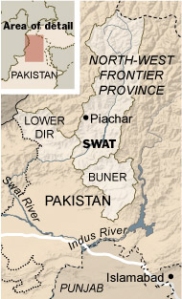By Human Rights commission of Pakistan

Lahore: The Human Rights Commission of Pakistan (HRCP) is convinced that the cost of the insurgency in the Malakand Division has been increased manifold by the shortsightedness and indecisiveness of the non-representative institutions and their policy of appeasing the militants and cohorting with them. While the ongoing military operation had become unavoidable, it was not adopted as a measure of the last resort. Further, the plight of the internally displaced people has been aggravated by lack of planning and coordination by the agencies concerned, and the methods of evacuation of towns/villages and the arrangements for the stranded people have left much to be desired.
Based on reports by HRCP activists in the Malakand Division and other parts of NWFP/Pakhtunkhwa, visits to IDP camps by its activists and senior board members, and talks with many displaced people and several Nazims and public figures, the commission has released the following statement on the situation, its conclusions and recommendations:
Background:
The Human Rights Commission of Pakistan (HRCP) has reported, time and again over the last many years, on the rising exodus of IDPs from FATA and the Malakand Division, owing to deteriorating security situation, and warned the government of the consequences. IDPs in Balochistan have also been an issue of concern and separate statements on it have been issued by HRCP.
For over two decades the government of Pakistan, in particular the military, tolerated, if it did not collude with them, the religious militants and extended impunity to them as well as to all forms of acts of religious intolerance. It was common knowledge that international as well as national religious militants had safe havens in the country. After September Eleven, militants of all shades were reinforced and given a free hand to organize themselves at the cost of the freedom of the local population in FATA. Other parts of the country also continued to suffer but initially parts of FATA (Federally Administered Tribal Area) became the central hub of all militant groups, local, national, regional and international. The Musharraf government did not simply turn a blind eye but by all accounts, (including those of IDPs), several incidents revealed a policy to protect certain leaders of militant groups. The government has never given a satisfactory explanation on the supply lines of finances, vehicles, arms/ammunition and petrol that the militants have never been short of. This is particularly questionable in the case of Swat, which is a settled area and surrounded by territory in control of the government.
Amongst other reports, a number of credible sources (including official sources) confirmed that in December 2006, a vehicle was impounded by SHO Amir Zaman of police station Kabal, which was full of explosives. The destination of this pick-up was the Dera (house) of Fazallullah, popularly known as Maulana Radio. The SHO who impounded the vehicle was ordered by phone to stop all proceedings till higher police officials instructed him to proceed in the matter. As the DIG of the area was on leave, SP Qudratullah Marwat is said to have personally ordered that the van be released with the explosives as he had instructions from “higher authorities” to release the pick-up. In addition a number of other well placed sources confirmed that groups of militants from Waziristan were officially escorted to Swat in 2007.
Human Rights Commission for Pakistan for more
(Submitted by reader)
